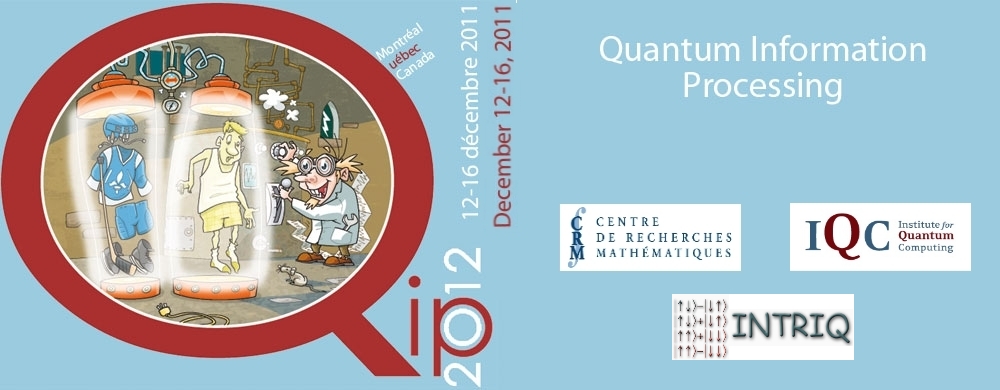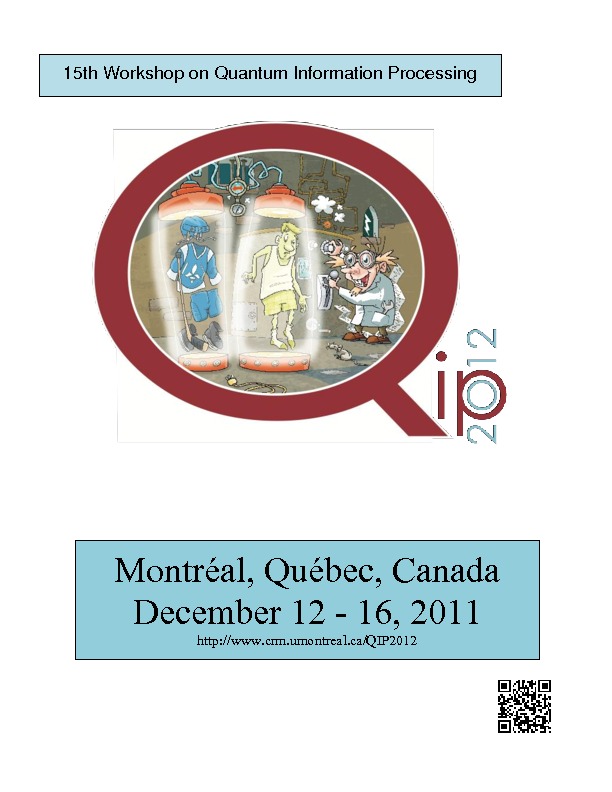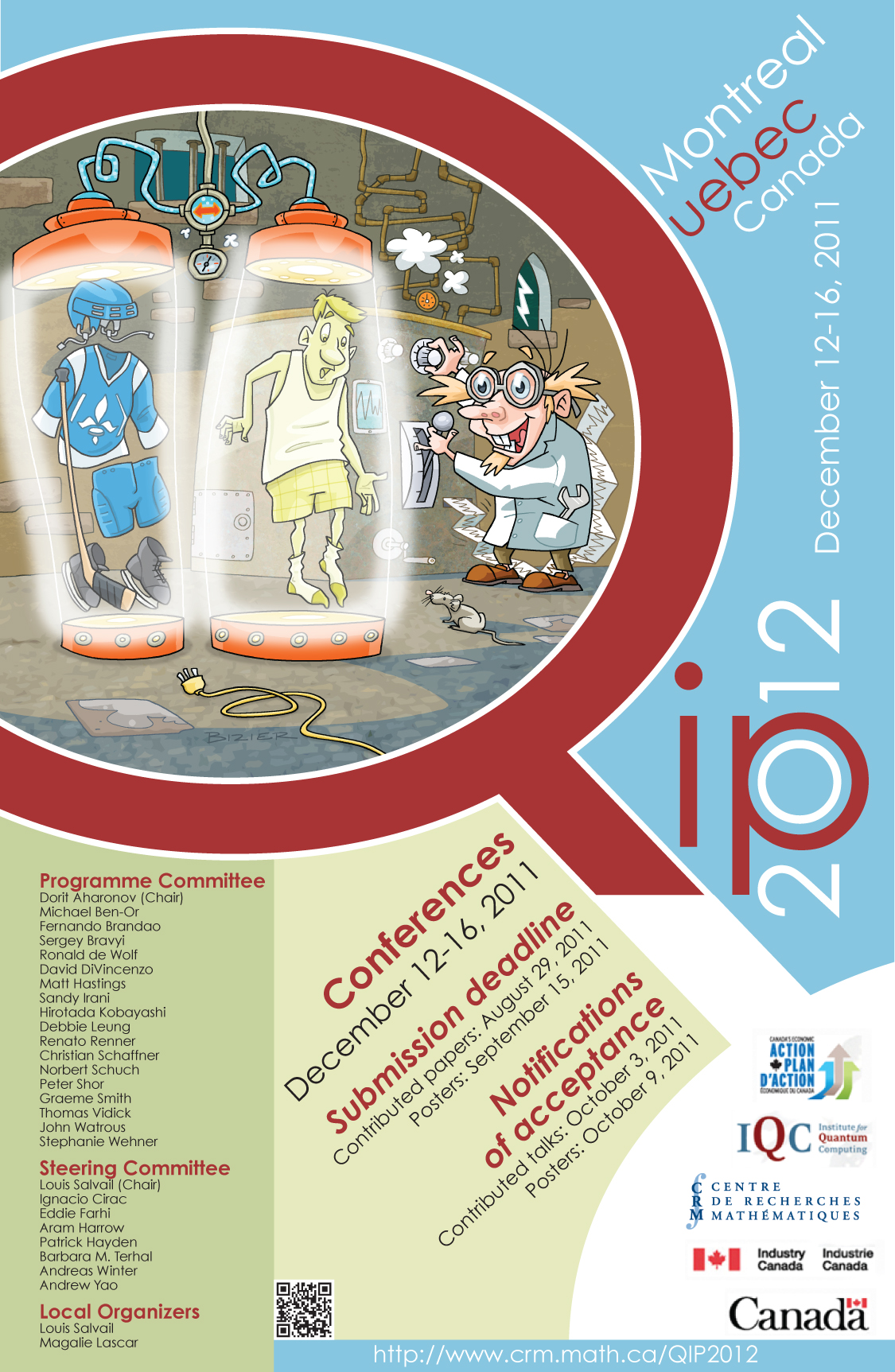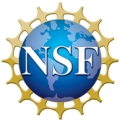The Best Scientific Posters
As determined by the participants' votes, the following authors were awarded the price for the best scientific posters:
- - Andrew Childs, Shelby Kimmel and Robin Kothari.
The quantum query complexity of read-many formulas.
- - Daniel Nagaj, Libor Caha, Sergey Bravyi and Ramis Movassagh.
Quantum 2-SAT in 1D with Qutrits.
Schedule
There will be poster sessions, Monday and Tuesday (December 12-13),
starting from 17:15 in the SALLE POLYVALENTE (SH-4800) just above the conference
hall. If any of the posters cannot be presented, you are kindly requested to
inform us as soon as possible. On the other hand, if someone's poster is
not listed below, please contact us immediately. The following posters will be presented.
Installation Instructions
Each accepted poster will be assigned a panel-space large enough to hold a poster of height 4 feet (120 cm) and width 3.6 feet (110 cm). Being of 8-feet width, panels can hold 2 posters side by side of this size. Please use portrait rather than landscape (wide) orientation.
Please have your poster number from QIP'2012 website or the programme Booklet. This unique number determine whether your session is on Monday or Tuesday, and where to install your poster. You should install your poster the day of your session starting from noon, and remove it at the end of this session.
Posters will be rewarded symbolic prices, at the social dinner, based on the outcome of the votes. You are highly encouraged to vote for the best posters. There will be two voting boxes for this purpose.
Monday Session
1
A.C. Cem Say and Abuzer Yakaryilmaz.
Quantum computation with narrow CTCs 2
Miguel Navascues, David Perez-Garcia and Ignacio Villanueva.
Inverting the Central Limit Theorem 3
Christian Weedbrook, Stefano Pirandola, Seth Lloyd and Timothy Ralph.
Quantum Cryptography Approaching the Classical Limit 4
Iordanis Kerenidis and Shengyu Zhang.
A quantum protocol for sampling correlated equilibria unconditionally and without a mediator 5
Johannes Wilms, Julien Vidal, Frank Verstraete and Sébastien Dusuel.
Mutual information in the Lipkin-Meshkov-Glick model 6
Bill Rosgen.
Testing quantum circuits and detecting insecure encryption 7
Anna Vershynina, Bruno Nachtergaele and Valentin Zagrebnov.
Lieb-Robinson Bounds and the Existence of the Thermodynamic Limit for a Class of Irreversible Quantum Dynamics 8
Loïck Magnin and Jérémie Roland.
Quantum adversary lower bounds by polynomials 9
Shen Chen Xu and Mark Wilde.
Sequential, successive, and simultaneous decoders for entanglement-assisted classical communication 10
David Lyons and Scott Walck.
Local unitary classes of symmetric mixed states 11
Maarten Van Den Nest.
A monomial matrix formalism to describe quantum many-body states 12
Alastair Kay.
The Capabilities of a Perturbed Toric Code as a Quantum Memory 13
Nengkun Yu, Runyao Duan and Mingsheng Ying.
Distinguishing Maximally Entangled States by PPT Operations and Entanglement Discrimination Catalysis 14
Nilanjana Datta and Min-Hsiu Hsieh.
One-shot entanglement-assisted classical communication 15
Sevag Gharibian, Jamie Sikora and Sarvagya Upadhyay.
QMA variants with polynomially many provers 16
Rahul Jain and Ashwin Nayak.
A short proof of the Quantum Substate Theorem 17
Sandeep Narayanaswami and Sean Hallgren.
9-State 1-Dim Hamiltonians is QMA-complete 18
Andris Ambainis, Artūrs Bačkurs, Balodis Kaspars, Dmitry Kravcenko, Raitis Ozols, Juris Smotrovs and Madars Virza.
Quantum strategies are better than classical in almost any XOR game -
19
Akbar Fahmi.
Inequalities for Testing Non-local Hidden Variable Models Versus Quantum Correlations
-
20
Zhaohui Wei and Shengyu Zhang.
On characterizing quantum correlated equilibria
-
21
Shengshi Pang and Shengjun Wu.
Unambiguously determining the orthogonality of multiple quantum states
-
22
Tsuyoshi Ito.
Parallelization of entanglement-resistant multi-prover interactive proofs
-
23
Marcio F. Cornelio, Marcos C. De Oliveira and Felipe F. Fanchini.
Entanglement Irreversibility from Quantum Discord and Quantum Deficit
-
24
Andrew Childs, Shelby Kimmel and Robin Kothari.
The quantum query complexity of read-many formulas
-
25
Felipe Fanchini, Marcio Cornelio, Marcos De Oliveira and Caldeira Amir.
Conservation law for distributed entanglement of formation and quantum discord
26
Marcelo França Santos, Marcelo Terra Cunha, Rafael Chaves and André Carvalho.
Quantum computing with incoherent resources and quantum jumps -
27
Masaki Owari and Masahito Hayashi.
Asymptotic local hypothesis testing between a pure bipartite state and the completely mixed state
-
28
Matthew Mckague.
On the power quantum computation over real Hilbert spaces
-
29
Robin Blume-Kohout, Sarah Croke and Michael Zwolak.
The power of O(1) qubits: perfect state discrimination with tiny quantum computers
-
30
Jin Woo Jun.
Entanglement Swapping in an Imperfect Channel
-
31
Gorjan Alagic and Edgar Bering.
Quantum Algorithms for Invariants of Triangulated Manifolds
-
32
Roman Orus and Tzu-Chieh Wei.
Topological Geometric Entanglement of Blocks in Toric Codes
-
33
David Rosenbaum and Aram Harrow.
Uselessness for an oracle model with internal randomness
-
34
Sadegh Raeisi, Nathan Wiebe and Barry Sanders.
Designing quantum circuits for efficient many-body quantum simulation
-
35
Clare Horsman.
Quantum picturalism for topological cluster-state computing
-
36
Yoshifumi Nakata, Peter Turner and Mio Murao.
Entanglement of phase-random states
-
37
Go Kato and Koji Azuma.
Optimal entanglement manipulation via coherent-state transmission
-
38
Tony Dorlas and Ciara Morgan.
The invalidity of a strong capacity for a quantum channel with memory
-
39
Joonwoo Bae, Won-Young Hwang and Yeong-Deok Han.
No-Signaling Principle, Guessing Probability, and General Structure of Optimal Quantum State Discrimination
-
40
Giannicola Scarpa and Simone Severini.
The Rank-1 Quantum Chromatic Number
-
41
Andris Ambainis, Arturs Backurs, Nikolajs Nahimovs, Raitis Ozols and Alexander Rivosh.
Search by quantum walks on two dimensional grid without amplitude amplification
-
42
Earl Campbell and Jens Eisert.
Gaussification and entanglement distillation of continuous variable systems: a unifying picture
-
43
Pawel Wocjan and Pradeep Sarvepali.
Quantum Algorithms for One-Dimensional Infrastructures
-
44
Farid Ablayev and Alexander Vasiliev.
Quantum Fingerprinting for Quantum Branching Programs
-
45
Mamdouh Abbara and Jean-Pierre Tillich.
Quantum turbo-codes with unbounded minimum distance and excellent error-reducing performance
46
Aman Chawla.
Reliability of a classical-quantum communication system with noisy feedback -
47
Martin Kliesch, Thomas Barthel, Christian Gogolin, Michael Kastoryano and Jens Eisert.
Efficient simulation of dissipative quantum dynamics on a quantum computer
-
48
Runyao Duan, Simone Severini and Andreas Winter.
On zero-error communication via quantum channels in the presence of noiseless feedback
-
49
Seiichiro Tani.
Optimally Fast Quantum Solitude Detection on Anonymous Directed Networks
-
50
Mateus De Oliveira Oliveira.
Band Diagonal Strategies for Two-Prover One-Round Entangled Non-Local Games
51
Marco Tlúio Quintino, Mateus Araújo, Daniel Cavalcanti, Marcelo França Santos and Marcelo Terra Cunha.
Maximal CHSH violations with low efficiency photodetection and homodyne measurements 52
Mario Berta, Matthias Christandl, Fernando Brandao and Stephanie Wehner.
Entanglement Cost of Quantum Channels 53
Mario Berta, Fabian Furrer and Volkher Scholz.
The Smooth Entropy Formalism on von Neumann Algebras 54
Yun Shang, Xian Lu and Ruqian Lu.
Linear bounded automata based on unsharp quantum logic 55
Sayyed Yahya Mirafzali and Ali Ahanj.
Measurement-induced nonlocality for an arbitrary bipartite state 56
Matthias Ohliger, Vincent Nesme and David Gross.
Quantum compressed sensing with general measurements 57
Robert Raussendorf, Pradeep Sarvepalli, Tzu-Chieh Wei and Poya Haghnegahdar.
Measurement based quantum computation as a toy-model for a quantum theory of spacetime 58
Mirmojtaba Gharibi.
Reduction from non-injective hidden shift problem to injective hidden shift problem 59
Iman Marvian and Robert Spekkens.
A generalization of Schur-Weyl duality with applications in quantum estimation 60
Nathan Harshman.
I Come To Bury Entanglement, Not To Praise It 61
Thiago Maciel, Andre Cesario and Reinaldo Vianna.
Variational quantum tomographies with incomplete information
62
Niek Bouman, Serge Fehr, Carlos González-Guillén and Christian Schaffner.
An All-But-One Entropic Uncertainty Relation, and Application to Password-based Identification
Tuesday Session
63
Tiago Debarba.
Relativistic Quantum Bit via Foundations of Relativistic Quantum Theory 64
Oscar Dahlsten, Daniel Lercher and Renato Renner.
Tsirelson's bound from a Generalised Data Processing Inequality 65
Adrian Hutter, Lídia Del Rio, Renato Renner and Stephanie Wehner.
An information-driven approach to thermodynamics
66
Peter Høyer and Jibran Rashid.
Quantum Nonlocal Boxes Exhibit Stronger Distillability 67
Santosh Shelly Sharma and Naresh Kumar Sharma.
Classification of Multipartite Entanglement via Negativity Fonts 68
Fernando Iemini.
Quantifying Quantum Correlations in Fermionic Systems using Witness Operators 69
Daniel J. Brod and Ernesto F. Galvão.
Extending matchgates into universal quantum computation
70
J K Sharma, Sushamana Sharma and Rajshri Vyas.
On obtaining maximally nonclassical state from arbitrary classical state using inverse boson operators 71
Laszlo Gyongyosi and Sandor Imre.
Superactivated Quantum Repeaters 72
Raphael Dias Da Silva and Ernesto F. Galvão.
Translating measurement-based quantum computation into compact quantum circuits
73
Mark Wilde and Saikat Guha.
Polar codes for classical-quantum channels 74
Ashley Montanaro, Richard Jozsa and Graeme Mitchison.
Exact quantum query algorithms for small boolean functions 75
Sheng-Mei Zhao, Xiang-Liang Dong, Fei Cao and Long-Yan Gong.
A novel quantum key distribution protocol and its experimental implement 76
Daniel Nagaj, Libor Caha, Sergey Bravyi and Ramis Movassagh.
Quantum 2-SAT in 1D with Qutrits 77
Raqueline A. M. Santos, Renato Portugal and Franklin L. Marquezino.
Decoherence on Szegedy's Quantum Walk 78
Davide Girolami and Gerardo Adesso.
Observable measure of quantum correlations 79
Courtney Brell, Stephen Bartlett and Andrew Doherty.
A Perturbative Approach to PEPS Parent Hamiltonians 80
Dominic Else, Stephen Bartlett and Andrew Doherty.
Measurement-based quantum computation with the cluster state is robust to symmetric perturbations in the parent Hamiltonian 81
Fuyuhiko Tanaka and Takuma Takeuchi.
Hypothesis testing of a maximally entangled state under the unknown unitary process 82
Prashant Kumar and Andrew Doherty.
A Class of Quantum Double Subsystem Codes 83
Viv Kendon
Where to quantum walk? 84
Junghee Ryu, James Lim, Changhyoup Lee and Jinhyoung Lee.
Nonlocality test for continuous variable system with local symplectic operation 85
Naresh Kumar Sharma, Santosh Shelly Sharma and Paulo Jose Dos Reis.
Entanglement generation between remote atomic qubits interacting with two mode Squeezed vacuum field 86
Santosh Shelly Sharma, Naresh Kumar Sharma and Paulo Jose Dos Reis.
Classification of Four qubit Entangled States via negativity Fonts 87
Si-Hui Tan, Leonid Krivitsky and Berthold-Georg Englert.
Measuring quantum correlations using lossy photon-number-resolving detectors with saturation 88
Yingkai Ouyang.
Improved Upper Bounds on the Quantum Capacity of the Depolarizing Channel with Higher Dimension Amplitude Damping Channels 89
Mike Mullan and Emanuel Knill.
Optimal Algorithms for Quantum Clocks 90
Radel Ben-Av and Iaakov Exman
Z-States Algebra for the Multi-Party Entanglement-Distillation Protocol 91
Smarajit Das, Naresh Sharma and Siddharth Muthukrishnan.
On some special cases of the Entropy Photon-Number Inequality 92
Dvir Kafri and Jacob Taylor.
Algorithmic Cooling of a Quantum Simulator 93
Christian Schuette-Nuetgen, Cyril Stark and Renato Renner.
Dipole-Dipole-Interaction-Induced Anyon Dynamics in the Toric Code 94
Ernesto Galvao, Raphael Dias Da Silva and Elham Kashefi.
Closed timelike curves in measurement-based quantum computation 95
Tina Yu and Chen-Hsiang Yeang.
Quantum Clustering-Based Sampling Algorithms for Active Machine Learning 96
Abuzer Yakaryilmaz and A.C. Cem Say.
NP has log-space verifiers with fixed-size public quantum registers 97
Jean-Daniel Bancal, Stefano Pironio, Antonio Acin, Yeong-Cherng Liang, Valerio Scarani and Nicolas Gisin.
Revealing nonlocal correlations without measuring them: Hidden influence explanations of quantum correlations can not remain hidden 98
Siddhartha Santra, N. Tobias Jacobson, Lorenzo Venuti and Paolo Zanardi.
Exact infinite-time statistics of the Loschmidt echo for a quantum quench 99
Siddhartha Santra, Alioscia Hamma and Paolo Zanardi.
Quantum Entanglement in Random Physical States 100
David Reeb, Teiko Heinosaari, Anastasia Jivulescu and Michael M. Wolf.
Extension Theorems for Quantum Operations 101
Eyuri Wakakuwa and Mio Murao.
Extended Nonlocality-Assisted Random Access Coding and Information Causality 102
Maxime Hardy and William A. Coish.
Heisenberg scaling of time-limited quantum metrology with realistic decoherence 103
Yuji Hirono, Shojun Nakayama, David Jennings, Terry Rudolph and Mio Murao.
An extension of the exchange fluctuation theorem for initially correlated systems 104
Fernando Brandão, Jonathan Oppenheim and Sergii Strelchuk.
When does noise increase the quantum capacity? 105
Cedric Beny.
Causal structure of MERA 106
Marc Kaplan and Gilles Brassard.
Simulating equatorial measurements on GHZ states with finite expected communication cost 107
Rodrigo Gallego, Lars Erik Würflinger, Antonio Acin and Miguel Navascues.
Quantum correlations require multipartite information principles 108
Moritz Ernst and Rochus Klesse.
Tackling Quantum Channel Capacities using suitable Random Codes 109
Emilie Pelchat and David Poulin.
Degenerate Viterbi Decoding 110
Jens Eisert, Markus Mueller, Christian Gogolin and Martin Kliesch.
Undecidability of quantum measurement occurrence 111
Yasuhito Kawano.
Extended Clifford Group Circuit and Applications 112
Jeonghoon Park and Soojoon Lee.
Zero-error classical capacity of qubit channels cannot be superactivated 113
Nicolas Menicucci, Steven Flammia and Peter Van Loock.
Graphical calculus for Gaussian pure states 114
Michael Walter, Matthias Christandl, Stavros Kousidis and Brent Doran.
Non-Abelian Duistermaat-Heckman Measures and the Quantum Marginal Problem
115
Keisuke Fujii and Yuuki Tokunaga.
Error Correction Property of the Surface Codes with General Lattices 116
Giulio Chiribella.
Perfect discrimination of no-signalling channels via quantum superposition of causal structures 117
Dmitry Kravchenko.
EWL Scheme for Quantum Voting 118
Paul Pham and Krysta Svore.
A Nearest-Neighbor Architecture for Shor's Factoring Algorithm with Sub-Quadratic Depth 119
Domingo Rodriguez.
A Computational Modeling Framework for Quantum Fourier Transform Algorithms 120
Philippe Faist, Johan Aaberg and Renato Renner.
On the Optimality of Work Extraction in Small Thermodynamical Systems 121
Pascal Basler, Normand Beaudry and Renato Renner.
In the search of operational quantities for characterizing large quantum systems 122
Devin Hugh Smith, Geoff Gillett, Marcelo P. De Almeida, Cyril Branciard, Alessandro Fedrizzi, Till J. Weinhold, Adriana Lita, Brice Calkins, Thomas Gerrits, Sae Woo Nam, Howard Wiseman and Andrew G. White.
Steering with superconducting transition edge sensors 123
Nilanjana Datta and Min-Hsiu Hsieh.
The apex of the family tree of protocols: Optimal rates and resource inequalities
124
Jonas Anderson and Chris Cesare.
Homological Stabilizer Codes
125
Aysajan Abidin and Jan-Åke Larsson.
Security of Authentication with Partially Fixed Key in
Quantum Key Distribution
126
Justyna (Pytel) Zwolak and Spyridon Michalakis.
Stability Of Frustration-Free Hamiltonians
|











